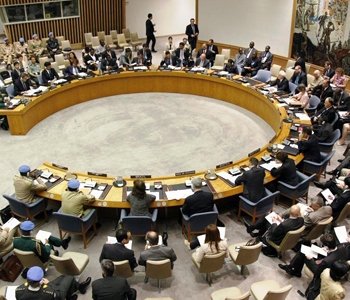France takes on US in Darfur battle at UN
UNITED NATIONS, March 23 (AFP) — The UN Security Council remained deeply split over Sudan, with France challenging the United States over its position on handling trials of possible war crimes in Darfur.
 The council faces a Thursday deadline to approve a peacekeeping force to monitor the January peace accord that ended 21 years of north-south civil war in Sudan, Africa’s largest country.
The council faces a Thursday deadline to approve a peacekeeping force to monitor the January peace accord that ended 21 years of north-south civil war in Sudan, Africa’s largest country.
But nations are at odds over how to tackle the separate crisis in Sudan’s Darfur region, where an estimated 180,000 people have died since a rebel uprising against the Sudanese government was launched more than two years ago.
The United States has proposed establishing a special court in Tanzania to handle any war crimes trials, as well as slapping targeted sanctions on selected individuals blamed for violating human rights.
Most council nations, however, support referring war crimes proceedings to the International Criminal Court (ICC) in The Hague, the world’s first permanent tribunal for crimes against humanity, genocide and war crimes.
Yet the administration of US President George W. Bush staunchly opposes the ICC over fears that US citizens could be the target of lawsuits politically motivated by opposition to US policies.
The council has been deadlocked over the issue for two months, since a commission of enquiry found crimes against humanity had likely been committed in Darfur.
The impasse has so far kept the council from approving the peacekeeping force, which most nations agree is crucial to keeping the north-south peace process in Sudan on track and preventing a slide back into civil war.
To break the stalemate, the United States put forward three draft resolutions — one each on peacekeepers, sanctions and war crimes — hoping to get immediate action to approve a 10,000-strong peace force.
“We were unable to come to agreement on an omnibus resolution, so in our view the only way to proceed … was to split up the three,” US deputy UN ambassador Anne Patterson said on Tuesday.
“We were literally running out of time,” she said.
Diplomats said Washington proposed in a closed-door meeting Wednesday that the other two could be considered later, with the war crimes draft offering the choice of the ICC, the US-proposed court in Tanzania and a third option.
But France, insistent on bringing the matter to the ICC, counter-proposed a resolution to refer the matter to the ICC, effectively challenging Washington to abstain and let it pass — or use its veto power.
One diplomat described the closed-door discussion as a “shootout.”
If the peace mission is not approved on Thursday, the council would have to pass a third consecutive extension for the current UN mission, which is already on the ground preparing for the arrival of UN troops.
Brazilian UN ambassador Ronaldo Mota Sardenberg, the current council president, said late Tuesday that the council should take some kind of vote immediately, even if that meant postponing a decision on war crimes trials.
“It’s better for the council to start taking action, even if it’s a modest action … so that people see that the council is working,” he said.
But Richard Dicker, head of the international justice division at Human Rights Watch, said the impasse had shown the council was not working on Darfur, and scoffed at concerns over the council’s image.
“This isn’t about the council, this is about the council protecting people at risk,” he said, arguing that the possibility of war crimes trials could help stop the ongoing violence.
“This has been a stunning demonstration of paralysis in the council,” Dicker told AFP. “They look awful.”
Well more than a million people have been left homeless in Darfur, many of them herded into unsafe camps where they have been subjected to attacks either from government-backed militias or from rebels.
Council disagreements on what to do run far deeper than the row over referring Darfur to the ICC, a move also opposed by China and Algeria. Russia and China have also come against applying any individual sanctions.
